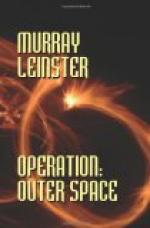There was no point in standing guard over the ship. If the bed of hot ashes did not guard it, it was not likely that an individual merely sitting up and staring out its ports would do much good. There were extremely minor, practically unnoticeable vibrations of the ship from time to time. They would be volcanic temblors—to be expected. They were not alarming, certainly, and the forest outside was guarantee of no great violence to be anticipated. The trees stood firm and tall. There was no worry about the ship. It was perfectly practical, and even necessary simply to turn out the lights and go to sleep.
But Cochrane could not relax. He was annoyed by the soreness of his muscles. He was irritated by the picture given him of the expedition as a group of heedless ignoramuses who’d taken off without star-charts or bacteriological equipment—without even apparatus to test the air of planets they might land on!—and who now were sternly warned not to make any use of their achievement. Cochrane was not overwhelmed by the achievement itself, though less than eighteen hours since the ship and all its company had been aground on Luna, and now they were landed on a new world twice as far from Earth as the Pole Star.
It is probable that Cochrane was not awed because he had a television-producer’s point of view. He regarded this entire affair as a production. He was absorbed in the details of putting it across. He looked at it from his own, quite narrow, professional viewpoint. It did not disturb him that he was surrounded by a wilderness. He considered the wilderness the set on which his production belonged, though he was as much a city man as anybody else. He went back to the control-room. With the ship standing on its tail that was the highest point, and as the embers burned out and the smoke lessened it was possible to look out into the night.
He stared at the dimly-seen trees beyond the burned area, and at the dark masses of mountains which blotted out the stars. He estimated them, without quite realizing it, in view of what they would look like on a television screen. When light objects in the control-room rattled slightly, he paid no attention. His rehearsal-studio had been rickety, back home.
Babs seemed to be sleepless, too. There was next to no light where Cochrane was—merely the monitor-lights which assured that the Dabney field still existed, though blocked for use by the substance of a planet. Babs arrived in the almost-dark room only minutes after Cochrane. He was moving restlessly from one port to another, staring out.
“I thought I’d tell you,” Babs volunteered, “that Doctor Holden put some algae from the air-purifier tanks in the airlock, and then opened the outer door.”
“Why?” asked Cochrane.
“Algae’s Earth plant-life,” explained Babs. “If the air is poisonous, it will be killed by morning. We can close the outer door of the lock, pump out the air that came from this planet, and then let air in from the ship so we can see what happens.”




